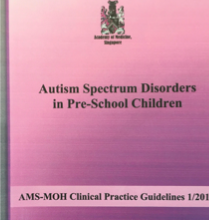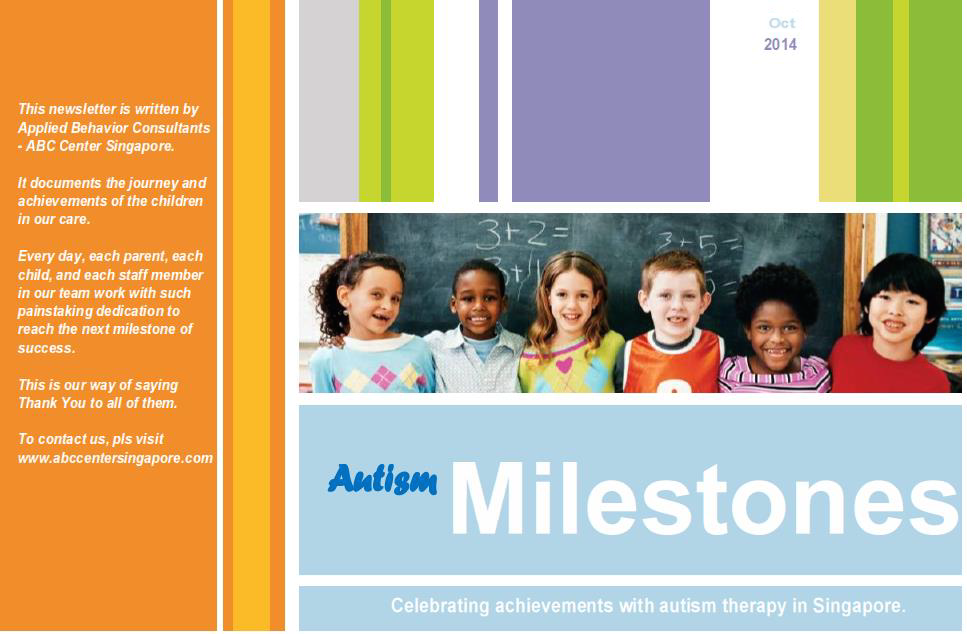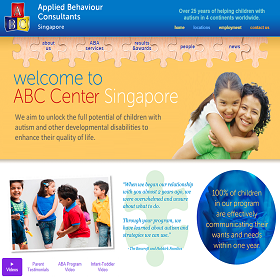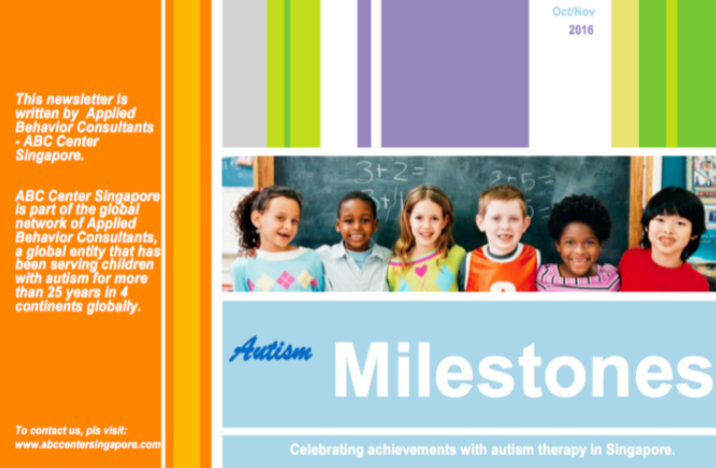
For parents of children with autism, it is difficult to know which learning program is best for their children. There are many different ones available, so it can be confusing. To help parents, we speak to Ms Hui Ling Loh, M.A., B.C.B.A, Clinical Supervisor of Applied Behavior Consultants (ABC) Center Singapore.
Among the many teaching methods for children with autism, EIBI, which is often used together with ABA (Applied Behavior Analysis) is the only one Grade A/Level 1++ by the Singapore Ministry of Health. Why do you think this is so?
HLL: I think this is because ABA is the one with the highest level of clinical proof to support its results. It has more than 50 years of clinical data to show that if it is applied well, it works well for the children.
As a result, among the different methods assessed by the Singapore Ministry of Health, this was the only one with the highest level of recommendation.
You stress ‘if it is applied well’, how can a parent tell if the ABA Program is being done well?
HLL: Parents need to research on the approach of the school/center, as well as the qualifications and expertise of those running the program.
First, ensure there is an Individualized Learning Plan based on a full assessment of the child. ABA cannot be done in a ‘cookie-cutter’ one-size-fits-all approach.
Then, expertise on constant data analysis and supervision of the program are essential to track the child progress and determine the direction of the program.
Let’s first discuss the initial assessment, how is this properly done?
HLL: A comprehensive assessment includes observing the child in a variety of environments, teaching and assessing socially significant skills. For us at ABC Center, we spend 8 hours to do this, over 4 separate sessions. This is done only by Behavior Analysts who are specifically trained on assessments . This is our way of meticulously understanding the child’s different skills (verbal, social, motor, cognitive and play skills).
How about quality of the teachers? How should this be assessed?
HLL: There are different sets of skills and expertise needed to run an ABA program, and parents need to ensure that the staff doing each part have the appropriate training for it.
Different sets of skills? What are these?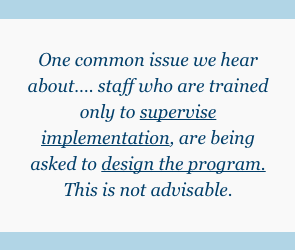
HLL: At ABC, we distinguish among 3 different skills among our teaching staff: the skill to implement, to supervise implementation, and to design the program. The education background and the clinical experience must be in line with the work to be done.
One of the most common issues we hear about other centers is that staff who are trained only to supervise implementation, are being asked to design the program. This is not advisable.
Why is that? Aren’t those who have supervised ABA implementation for many years already trained enough to design programs?
HLL: Not necessarily. The skill of designing the ABA program is very different from just supervising implementation. Those who supervise have been trained to follow the design accurately. But they have not been trained to design the program in the first place.
Designing the program takes a special skill of fully understanding the clinical basis for the child’s behavior, and then designing the right lessons for the child. Without this, it could be time wasted for the child.
What kind of training is necessary to design the ABA program well?
HLL: Years of clinical training and experience in designing programs. For us at ABC, the program is designed by Behavior Analysts who have strong education background in Applied Behavior Analysis (for instance, a Master’s Degree specifically in Applied Behavior Analysis) together with years of hands-on clinical experience on ABA program design.
We are fortunate to have Board Certified Behavior Analysts (BCBA’s) – those with a master’s degree, and have passed the very strict requirement for certification by the global Behavior Analyst Certification Board.
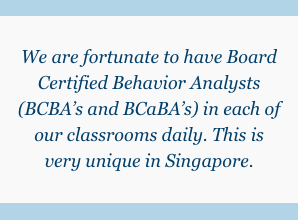 Do most centers have a Board Certified Behavior Analysts (BCBA)’s doing this work?
Do most centers have a Board Certified Behavior Analysts (BCBA)’s doing this work?
HLL: Unfortunately, there are only a handful of Board Certified Behavior Analysts living here in Singapore. We at ABC Center are very fortunate to have a BCBA/ BCaBA in our classrooms. This is very unique in Singapore.
How about in terms of Home-based Learning Programs? What do you recommend parents look for?
HLL: Similar to any other ABA program, the Home-based program should start from a proper assessment of the child. Then the individualized learning program should directly link with the child’s needs according. Again, the parent needs to check who is designing the program. They should be trained Behavior Analysts.
Beyond this, there should be focused supervision of the staff who implement the Home Program. For us at ABC, most of staff who go to the home programs are supervised either once a week, or once in two weeks. During supervision, we actually have two people in the home — one to run the lesson, and the other to check if it is being done well. This is the best way to ensure quality control.
Is this level of supervision only being done for home programs?
HLL: At ABC, we do this even for sessions at our center. We have multiple levels of supervision. Beyond the teachers who run the actual lesson, there is a supervisor in the classrooms ALL the time. And then, we also have the Behavior Analysts on-hand. This ‘multi-level’ everyday constant supervision is not common here in Singapore.
How about involvement of parents? Is this important?
HLL: Yes. Parent training and involvement is crucial. What the child learns during session must be consistent with what he does at home. This is the fastest way to ensure progress.
At ABC, we give an 8-week parent training for free to those with children enrolled with us. We teach the details of how ABA is done, and what should be done at home. Within this 8 week program, one session is even conducted in the home. This is to ensure that we are able to guide our parents as best as we can.
Any other tips for parents?
HLL: My last tip is regarding ‘generalization’. Generalization is the ability of the child use the skill learned during session to all the different environments where it is relevant. If a program does not plan for generalization from the beginning, the child is not able to reapply the skill in the real world — for instance, the child is only able to properly say hello to the teacher, and is not able to say hello to friends and peers. Or the child is only able to follow instructions when sitting at the table in a formal session, but not when playing a game with friends.
That seems to be very important. How is generalization done?
HLL: Generalization is a core specialty we have at ABC globally. We ensure this is designed into the child’s learning program. We have a unique 5-step generalization process (called ‘Recreating Environments to Accelerate Learning’ or R.E.A.L) created by our Founder and Chief Clinical Officer, Brenda Terzich-Garland, MA, BCBA, in the USA. Hence, we have a structured approach of making this happen.
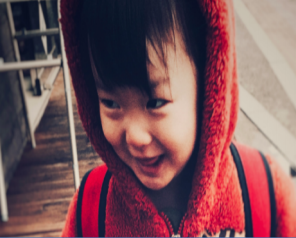
Andrew* used to hardly speak and could not even hold his head up straight. Now, child who has begun to give instructions to his teacher! We now see his personality as a happy and sometimes cheeky child!
If all of these are taught to the child well, can the parents really see progress?
HLL: Yes, if the ABA program is done well, there is definitely progress. At ABC, because of the focus we have on training, and supervision and the proper design and implementation, our results show that 100% of children make progress. We have been serving children for almost 30 years globally now, and it is great to see how our program has helped so many children.
Of course the speed of learning is different for every child. But it is always heartening to see how the children change and grow. One of our students, Andrew*, joined us about a year ago, when he was around 3 years old. When he joined, he was generally unresponsive to most instructions. He hardly spoke. He would be very awkward when sitting and standing, with his head tilted and constantly drooling.
However, things have now changed. He holds himself up straight. He follows instructions. Yesterday, he insisted to be the one to teach his teacher! He started giving instructions, ‘Teacher, eat corn’, he said. We now see his personality. He is a happy and sometimes cheeky child.
It is heartwarming to see how he is now such a different boy. For us, this makes a world of a difference.
ABC CENTER SINGAPORE is part of the global network of Applied Behavior Consultants – a global entity that has been serving children with autism for over 25 years in 4 continents worldwide. Our early intervention services include 1 on 1 ABA therapy, as well as our EarlyPreps group preschool program.
Our EarlyPreps group preschool is the only ABA-based program within the Singapore MSF PPIP program where Singaporean/PR children who meet requirements may apply for financial subsidy.
To contact ABC Center (Applied Behavior Consultants) Singapore, please see www.abccentersingapore.com or call (65) 94236248
BACK TO ABC CENTER SINGAPORE HOME PAGE
 *All photos and names are changed for confidentiality purposes.
*All photos and names are changed for confidentiality purposes.

